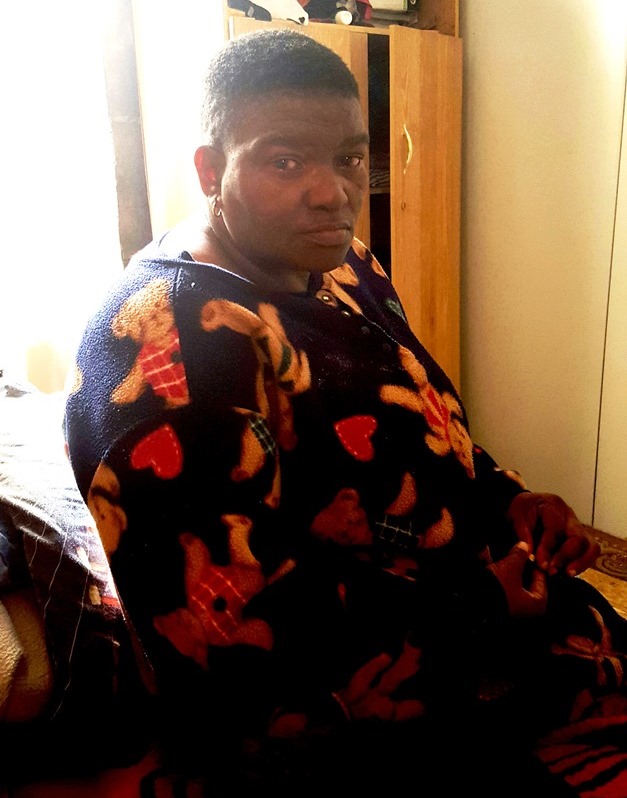
Nomahlubi Mbulu, with two severely disabled children, says she has reached breaking point. Photo: Mary-Anne Gontsana
5 May 2016
Ten months after GroundUp reported on the difficulties faced by a single mother in Old Crossroads struggling to take care of her three children, two of them severely disabled, the mother wants to give up her one daughter.
Drowning in debt and unable to properly look after 20-year-old Sibusiso Keyisi and 13-year-old Lilitha Keyisi, 48-year-old Nomahlubi Mbulu, told doctors at Lentegeur Hospital she does not want Lilitha back as she can no longer cope with caring for her.
Lilitha started getting fits at eight months. She was diagnosed with epilepsy, and later on, autism. Her condition is very severe and she is a danger to herself.
Both children have to go for check-ups once a month; Sibusiso at a clinic in Old Crossroads and Lilitha in Lentegeur. Mbulu takes a taxi to Lentegeur and says it is a struggle being with Lilitha in a taxi because of her screaming and uncontrollable limbs.
When GroundUp visited Mbulu two weeks ago, Lilitha was put in a corner and blockaded with a brown, torn up, two-seater couch that she had over time shredded. Not far from her, Sibusiso, who is also epileptic, was slouched in a chair, apparently unaware of his surroundings. The house smelt strongly of faeces.
Pushing the couch away from Lilitha, Mbulu held her as she jumped around screaming wildly. Mbulu pointed to the mess Lilitha had created behind the couch. Pieces of sponge from the couch were covering the floor and stains of faeces that Mbulu had tried to clean had dried on the floor.
“I am at a loss, I feel like I have been cursed and it is just getting worse. Sometimes, I just go to one of my close neighbours who help me, and I just take some time to myself, just for an hour and a half. I sleep or I just drift away,” says Mbulu.
“Lilitha can go two days without sleeping. If she does sleep, she sleeps around 4am. I am tired, I am sleep deprived, I cannot do this anymore.
“I am filled with debt from loans I have made to make ends meet. I get social grants for my son and daughter and for myself.”
Mbulu says, “Politicians, NGOs, the provincial department of social development and social workers have been here over the years; all have promised to provide help, but none of them have done anything. My children’s father stays just one street away from me, but both him and his family want nothing to do with me or the children.
“My other daughter who is 17, is doing matric this year. She struggles to study over Lilitha’s screams and I cannot even afford to send her to her matric ball. It’s tough, I just don’t know anymore.”
Lilitha’s condition is only getting worse.
“My biggest worry is that she has gained a habit of taking off her nappy and eating her faeces or smearing it on herself. I bath her four to five times a day, using dishwashing liquid, which I mix into her bath water, because she eats the soap bar and I do not have time to smear soap on her facecloth because in that split second, she gets out of the bath or she makes a mess,” says Mbulu.
Last week, Mbulu took Lilitha to Lentegeur Hospital for her check-up. Once a year, she receives respite care services for Lilitha, when she is relieved of her daughter for two weeks.
“I took Lilitha to Lentegeur and I told her doctor that I was going to leave her there because I could not take care of her anymore and no one was willing to help me. The doctor told me that they could not take care of her for more than two weeks, and I told the doctor that they would have to make a plan because I cannot cope anymore. I have reached my point. The doctor begged me not to leave,” says Mbulu.
Mbulu told the doctor that soon Lilitha would start menstruation and she did not know how she was going to cope with that as her daughter was unlikely to keep sanitary pads on.
The doctor said he would try to arrange something, but he could make no promises.
Responding to GroundUp when asked about Mbulu, spokesperson for Albert Fritz, the provincial minister of social development, Sihle Ngobese, said, “The department is aware of this case, and has been rendering extensive assistance and a basket of services to this family in conjunction with the Department of Health. Our collaborative efforts to date have included psychosocial support for the mother; respite care services for Lilitha; seating reviews and allocation of nappies and linen savers and bibs through the Department of Health; day care centre support for engagement in stimulation programmes for both children at a local centre; and non-profit organisation (NPO) support at home through regular home visits to ensure that the mother is supported to take care of her children.”
Ngobese said the department generally advocates for children to remain with their families and in their communities, as far as possible, unless there is absolutely no other alternative but to place them into institutional residential care.
“The social workers at our local office have offered these solutions to the mother and have facilitated the services to be mobilised. However, the mother has not been cooperative with our teams. The family’s full cooperation and commitment to the process is essential in making the above solutions work,” he said.
Asked about this assistance and these services, Mbulu says this was not her experience. She bought the nappies herself. She had not received any linen. There were no psychosocial support teams. Sibusiso gets one bib from the clinic. The only respite care services are the two weeks’ relief once a year for Lilitha.